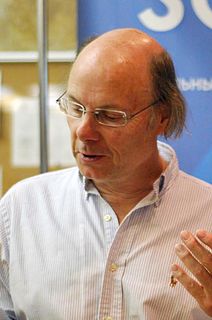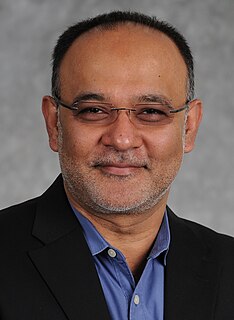Related Research Articles
The Association for Computing Machinery (ACM) is a US-based international learned society for computing. It was founded in 1947 and is the world's largest scientific and educational computing society. The ACM is a non-profit professional membership group, claiming nearly 100,000 student and professional members as of 2019. Its headquarters are in New York City.

Bjarne Stroustrup is a Danish computer scientist, most notable for the creation and development of the C++ programming language. He is a visiting professor at Columbia University, and works at Morgan Stanley as a Managing Director in New York.
Distributed computing is a field of computer science that studies distributed systems. A distributed system is a system whose components are located on different networked computers, which communicate and coordinate their actions by passing messages to one another from any system. The components interact with one another in order to achieve a common goal. Three significant characteristics of distributed systems are: concurrency of components, lack of a global clock, and independent failure of components. It deals with a central challenge that, when components of a system fails, it doesn't imply the entire system fails. Examples of distributed systems vary from SOA-based systems to massively multiplayer online games to peer-to-peer applications.
A distributed database is a database in which data is stored across different physical locations. It may be stored in multiple computers located in the same physical location ; or maybe dispersed over a network of interconnected computers. Unlike parallel systems, in which the processors are tightly coupled and constitute a single database system, a distributed database system consists of loosely coupled sites that share no physical components.
Alfred Vaino Aho is a Canadian computer scientist best known for his work on programming languages, compilers, and related algorithms, and his textbooks on the art and science of computer programming.

John Edward Hopcroft is an American theoretical computer scientist. His textbooks on theory of computation and data structures are regarded as standards in their fields. He is the IBM Professor of Engineering and Applied Mathematics in Computer Science at Cornell University, and the Director of the John Hopcroft Center for Computer Science at Shanghai Jiao Tong University.

An entity–relationship model describes interrelated things of interest in a specific domain of knowledge. A basic ER model is composed of entity types and specifies relationships that can exist between entities.
Jeffrey David Ullman is an American computer scientist and the Stanford W. Ascherman Professor of Engineering, Emeritus, at Stanford University. His textbooks on compilers, theory of computation, data structures, and databases are regarded as standards in their fields. He and his long-time collaborator Alfred Aho are the recipients of the 2020 Turing Award, generally recognized as the highest distinction in computer science.

David A. Bader is a Distinguished Professor and Director of the Institute for Data Science at the New Jersey Institute of Technology. Previously, he served as the Chair of the Georgia Institute of Technology School of Computational Science & Engineering, where he was also a founding professor, and the executive director of High-Performance Computing at the Georgia Tech College of Computing. In 2007, he was named the first director of the Sony Toshiba IBM Center of Competence for the Cell Processor at Georgia Tech. Bader has served on the Computing Research Association's Board of Directors, the National Science Foundation's Advisory Committee on Cyberinfrastructure, and on the IEEE Computer Society's Board of Governors. He is an expert in the design and analysis of parallel and multicore algorithms for real-world applications such as those in cybersecurity and computational biology. His main areas of research are at the intersection of high-performance computing and real-world applications, including cybersecurity, massive-scale analytics, and computational genomics. Bader built the first Linux supercomputer using commodity processors and a high-speed interconnection network.
A deductive database is a database system that can make deductions based on rules and facts stored in the (deductive) database. Datalog is the language typically used to specify facts, rules and queries in deductive databases. Deductive databases have grown out of the desire to combine logic programming with relational databases to construct systems that support a powerful formalism and are still fast and able to deal with very large datasets. Deductive databases are more expressive than relational databases but less expressive than logic programming systems. In recent years, deductive databases such as Datalog have found new application in data integration, information extraction, networking, program analysis, security, and cloud computing.
M. Dale Skeen is an American computer scientist. He specializes in designing and implementing large-scale computing systems, distributed computing and database management systems.
James David Foley is an American computer scientist and computer graphics researcher. He is a Professor Emeritus and held the Stephen Fleming Chair in Telecommunications in the School of Interactive Computing at Georgia Institute of Technology. He was Interim Dean of Georgia Tech's College of Computing from 2008–2010. He is perhaps best known as the co-author of several widely used textbooks in the field of computer graphics, of which over 400,000 copies are in print and translated in ten languages. Foley most recently conducted research in instructional technologies and distance education.

Mark Joseph Guzdial is a Professor in the College of Engineering at the University of Michigan. He was formerly a professor in the School of Interactive Computing at the Georgia Institute of Technology affiliated with the College of Computing and the GVU Center. He has conducted research in the fields of computer science education and the learning sciences and internationally in the field of Information Technology. From 2001–2003, he was selected to be an ACM Distinguished Lecturer, and in 2007 he was appointed Vice-Chair of the ACM Education Board Council. He was the original developer of the CoWeb, one of the earliest wiki engines, which was implemented in Squeak and has been in use at institutions of higher education since 1998. He is the inventor of the Media Computation approach to learning introductory computing, which uses contextualized computing education to attract and retain students.
The enhanced entity–relationship (EER) model in computer science is a high-level or conceptual data model incorporating extensions to the original entity–relationship (ER) model, used in the design of databases.
Amit Sheth is a computer scientist at University of South Carolina in Columbia, South Carolina. He is the founding Director of the Artificial Intelligence Institute, and a Professor of Computer Science and Engineering. From 2007 to June 2019, he was the Lexis Nexis Ohio Eminent Scholar, director of the Ohio Center of Excellence in Knowledge-enabled Computing, and a Professor of Computer Science at Wright State University. Sheth's work has been cited by over 48,800 publications. He has an h-index of 106, which puts him among the top 100 computer scientists with the highest h-index. Prior to founding the Kno.e.sis Center, he served as the director of the Large Scale Distributed Information Systems Lab at the University of Georgia in Athens, Georgia.
Richard Thomas Snodgrass is an American computer scientist and writer, currently employed as a professor at the University of Arizona. He is best known for his work on temporal databases, query language design, query optimization and evaluation, storage structures, database design, and ergalics.

Irfan Aziz Essa is a professor in the School of Interactive Computing of the College of Computing, and adjunct professor in the School of Electrical and Computer Engineering at the Georgia Institute of Technology. He is an associate dean in Georgia Tech's College of Computing and the director of the new Interdisciplinary Research Center for Machine Learning at Georgia Tech (ML@GT).
Ramez A. Elmasri is a computer scientist and a noted researcher in the field of database systems. He is also professor and associate chairman in the department of Computer Science and Engineering at The University of Texas at Arlington, Arlington, Texas. He is best known as the author of the textbooks: "Fundamentals of Database systems". His book has been a leading textbook in the database area worldwide for last 25 years. It is now in its 7th edition, which has been translated into Spanish, German, French, Italian, Portuguese, Chinese, Korean, Greek, Euskara, and in Arabic. His book is used as a standard textbook in India, Pakistan, Europe, South Africa, Australia and South East Asia, and is also widely used in the US, Canada, and South America. He has been working at The University of Texas at Arlington since 1990 and has had supervised 16 Ph.D. and more than 200 M.S. projects/ thesis.

Vijay K. Vaishnavi is a noted researcher and scholar in the computer information systems field with contributions mainly in the areas of design science research, software engineering, and data structures & algorithms, authoring over 150 publications including seven books in these and related areas, and co-owning a patent. He is currently Professor Emeritus at the Department of Computer Information Systems, Georgia State University. He is Senior Editor Emeritus of MIS Quarterly and is on the editorial boards of a number of other major journals. His research has been funded by the National Science Foundation (NSF) as well as by the industry.
References
- ↑ "DBLP Computer Science Bibliography for Shamkant B. Navathe showing 156 publications from 1975 to 2009".
- ↑ "IEEE Bibliography for Shamkant B. Navathe".
- ↑ "ACM Bibliography for Shamkant B. Navathe". Association for Computing Machinery ( ACM ).
- ↑ "Google Scholar results for Shamkant B. Navathe".
- ↑ "Scientific Commons Bibliography for Shamkant B. Navathe showing 50 publications from 1989- 2008".
- ↑ Elmasri, R.; Navathe, S. B. Fundamentals of Database Systems, Seventh Edition, 2015. Pearson.
- ↑ "Pubmed Bibliography for Shamkant B. Navathe".
- 1 2 3 4 "Prof Sham Navathe's Resume on College of Computing, Georgia Tech website". College of Computing, Georgia Institute of Technology.